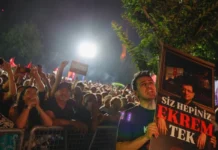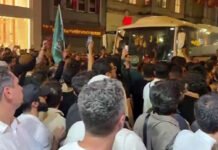Turkey has launched an investigation into a Dutch diplomat believed to have worked in Turkey as a spy, according to pro-government news channel aHaber and the Akşam and Sabah dailies.
The Dutch man, known only by the initials A.Z., is reportedly in Turkey on a diplomatic passport.
aHaber reported that he was in Turkey to investigate links between the Turkish government and radical Islamist terror organization the Islamic State in Iraq and the Levant (ISIL) and the Turkish operation in the Afrin province of northwestern Syria. The news station published footage that appears to be from surveillance cameras in Taksim Square in the center of İstanbul. The photos show a man greeting two other men, talking for a time and then walking off together.
According to the two newspapers, Turkey’s National Intelligence Organization (MİT) has been following the Dutch national for some time. The newspapers published a picture of two men talking to each other in a restaurant and reported that the Dutch man also worked in Afghanistan, attended meetings with members of the Syrian opposition and gave large sums of money to informants.
The Erdoğanist Sabah daily said the Dutch man intended “to distribute false information” about the relationship between Turkey and ISIL. The Turkish media reported that the Turkish government asked the Netherlands for clarification.
aHaber works under the direction of the Turkish government and autocratic Turkish President Recep Tayyip Erdoğan. The Akşam and Sabah dailies are also known as staunchly pro-government newspapers.
On Tuesday, the Dutch national accused of being a “spy” has left Turkey “for his own safety,” the Dutch Ministry of Foreign Affairs has stated. The ministry said the unidentified individual “worked at the Dutch Consulate General in İstanbul and was also responsible for regional activities,” the RTL Nieuws TV channel reported.
The relationship between the Netherlands and Turkey has been in a state of diplomatic crisis since March of last year. The Netherlands refused a landing permit to a plane carrying Turkish Foreign Minister Mevlüt Çavuşoğlu, who was scheduled to speak at a meeting in Rotterdam as part of the ruling Justice and Development Party’s (AKP) campaign for a referendum on the system of governance on April 16, 2017.
Dutch authorities also barred Family Minister Fatma Betül Sayan Kaya from entering the Turkish Consulate residence in Rotterdam. She was forced to remain in her vehicle for hours before being expelled to Germany for the same reason.
The incidents drew harsh criticism from Ankara, and the Foreign Ministry asked the Dutch ambassador to Turkey, who was out of the country on leave, not to return “for a while.” Nearly a year later, the Dutch Foreign Ministry has formally withdrawn its ambassador to Turkey.
Turkey also withdrew its ambassador to The Hague, and talks to resolve the crisis became deadlocked in January. Tensions increased in February when the Dutch parliament recognized the Armenian genocide.















